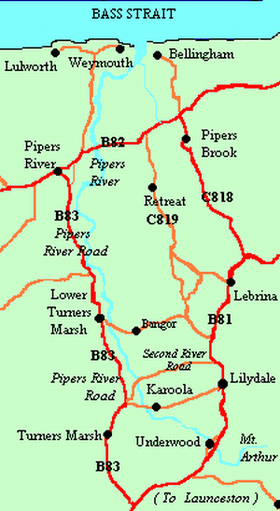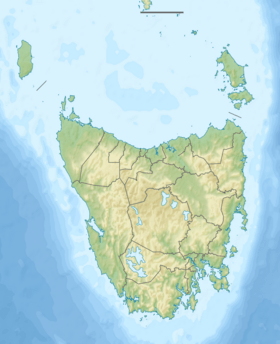Pipers River facts for kids
Quick facts for kids Pipers(wattra karoola) |
|
|---|---|

Pipers River area
|
|
| Country | Australia |
| State | Tasmania |
| Region | Northern Tasmania |
| Physical characteristics | |
| Main source | Mount Arthur south of Lilydale 975 m (3,199 ft) 41°18′20″S 147°16′54″E / 41.30556°S 147.28167°E |
| River mouth | Noland Bay, Bass Strait Pipers Heads 0 m (0 ft) 41°00′32″S 147°09′26″E / 41.00889°S 147.15722°E |
| Length | 59 km (37 mi) |
| Basin features | |
| Tributaries |
|
The Pipers River is a beautiful river found in the northern part of Tasmania, Australia. It's known as a perennial river, which means it flows all year long. The river was named after Captain Hugh Piper. Its original Aboriginal name is Wattra karoola.
Contents
Journey of the Pipers River
The Pipers River begins its journey below Mount Arthur. This mountain is located near a town called Lilydale. From there, the river flows through Hollybank Forest, which is a popular spot for visitors.
After passing through Hollybank, the river continues through the outer areas of Lilydale. It then travels towards Karoola and Lower Turners Marsh. Finally, it reaches the town of Pipers River.
Where the River Ends
The river finishes its long journey at Pipers Heads. This area is close to the towns of Weymouth and Bellingham. Here, the Pipers River flows into Noland Bay, which is part of the Bass Strait.
River's Length and Drop
The Pipers River travels about 59-kilometre (37 mi) from its start to its end. During this journey, it drops about 975 metres (3,199 ft) in height. This shows how much the land slopes from the mountains to the sea.
Rivers Joining Pipers River
Several smaller streams, called tributaries, flow into the Pipers River. These include Pipers Brook, which joins near Bellingham. Back Creek flows into the river near Weymouth. Rocky Creek also adds its water to the Pipers River near Lilydale. The river's flow is not very affected by tides, except right around the Weymouth area.
Amazing Wildlife in Pipers River
The Pipers River is home to some special creatures. One important animal found here is the Tasmanian giant freshwater crayfish. This is the largest freshwater crayfish in the world!
Protecting Unique Crayfish
Scientists have studied these crayfish from a spot in the Pipers River area called Little Creek. They found that these particular crayfish are genetically different from other crayfish of the same species. This means they are very unique. Because of this, the Pipers River area is considered a very important place for protecting these special crayfish.
 | Emma Amos |
 | Edward Mitchell Bannister |
 | Larry D. Alexander |
 | Ernie Barnes |


